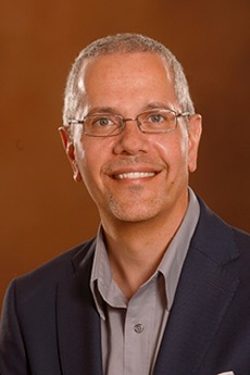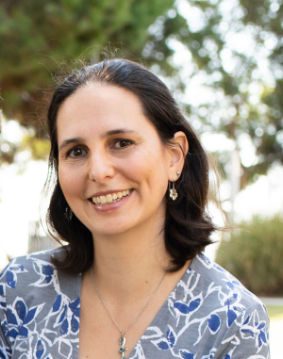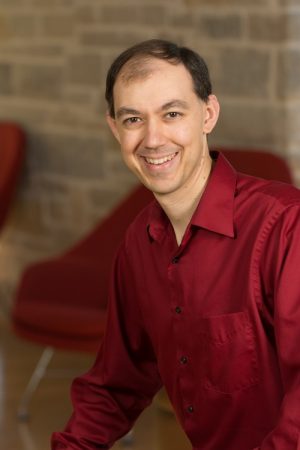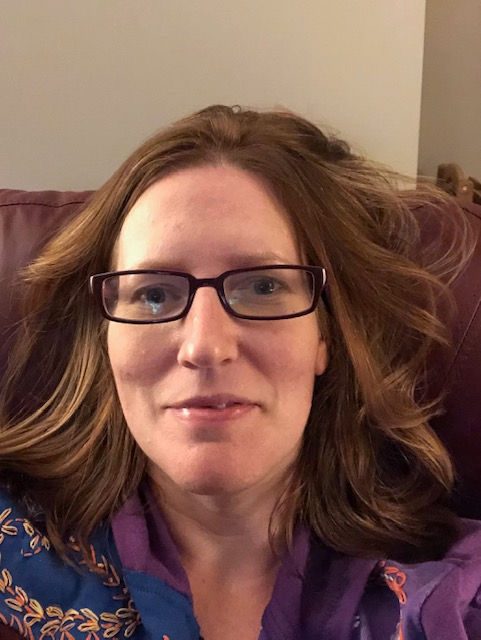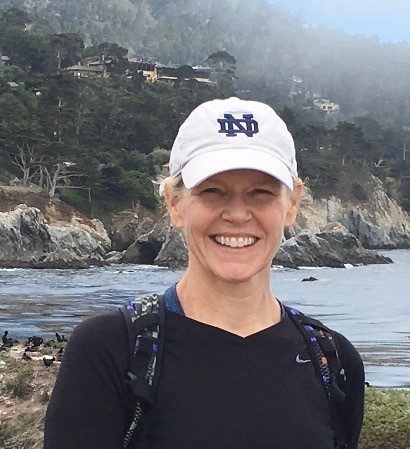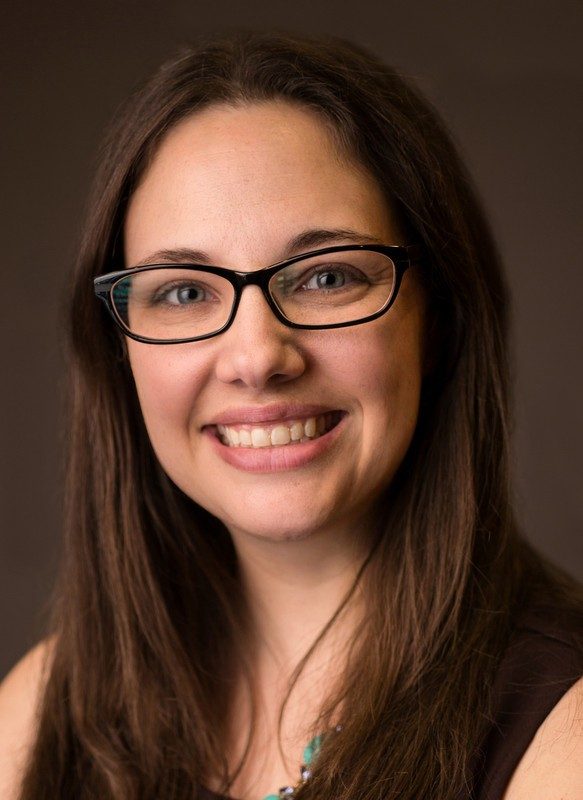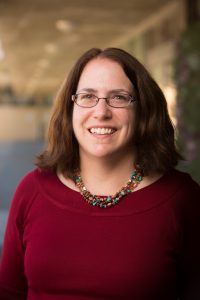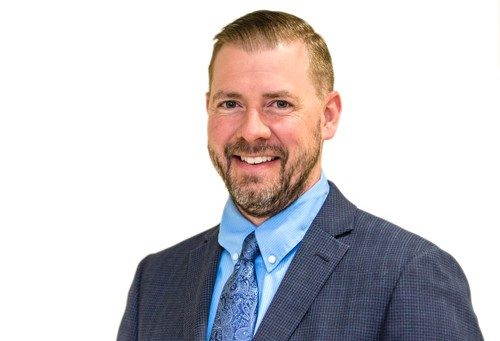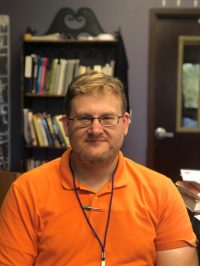Textbook Author and Lab Manual Teams
- Bradley Fahlman (Editor) - 10E & 2024 Release Author Team
- Nicole Bouview-Brown - 2024 Release Author Team
- John Kirk - 10E & 2024 Release Author Team
- Caroline Sloan - 2024 Release Author Team
- Resa Kelly - 10E & 2024 Release Author Team
- Stephanie Ryan - 10E Lab Manual Author Team, 2024 Release Author Team
- Kathleen Purvis-Roberts - 10E Author Team
- Patrick Daubenmire - 10E Author Team
- Michael Mury - 10E Lab Manual Author Team
Bradley Fahlman, Editor-in-Chief
Brad Fahlman is a professor of chemistry in the department of chemistry and biochemistry at Central Michigan University (CMU). He received a B.Sc. with high honours from the University of Regina (in Saskatchewan) in 1996. He was awarded a Ph.D. from Rice University in 2000 (adviser Prof. Andrew R. Barron) for his work on the organometallic synthesis of volatile Group 13 compounds and their application for thin-film growth via chemical vapor deposition.
Fahlman joined the faculty at CMU in 2002 after a two-year postdoctoral appointment at the University of California, Irvine. His research interests include the design of nanostructural electrode materials and atomic layer deposition of single atom catalysts for next-generation batteries and fuel cells, as well as utilizing graphitic carbon nitride for water purification and photocatalytic water splitting applications.
Fahlman’s research has been supported by the National Science Foundation, Department of Defense, Research Corporation, and the Dreyfus Foundation. He is co-author of more than 70 peer reviewed publications, has delivered more than 80 invited talks, and is the sole author of Materials Chemistry (Springer), currently in its 4th edition and recognized by a national textbook excellence award from the Text & Academic Authors Association.
Fahlman enjoys teaching general, inorganic, and materials chemistry at CMU. He is an advocate for contextual chemistry curricula as well as interactive and adaptable learning resources, which have greatly improved student motivation and interest. When not in the laboratory or classroom, Fahlman enjoys traveling with his wife, Diyonn, and is a FAA-certified drone pilot and professional photographer with extensive experience in photography/videography of real estate, landscape, wildlife, sports, and special events.
Nicole Bouvier-Brown
Nicole C. Bouvier-Brown is a professor at Loyola Marymount University (LMU) teaching in the Chemistry and Environmental Science programs.
She graduated summa cum laude with a BS degree in Chemistry/Biology (with an environmental emphasis) from St. Mary’s College of California in 2003. She earned a PhD in Environmental Science, Policy, and Management from the University of California, Berkeley in 2008 for her work on quantifying biogenic volatile organic compounds and discussing their implications for gas- and particle-phase atmospheric chemistry (advisor Allen H. Goldstein).
Bouvier-Brown joined the faculty at LMU in 2009 where her research has mainly focused on developing methodology and measuring air pollution exacerbated by human activity. She and her students have looked at the unequal burden of air pollution experienced by low-income neighborhoods and quantified emissions of volatile organic compounds coming from artificial turf fields. More recently, Bouvier-Brown has become more interested in effective undergraduate teaching of difficult scientific ideas. To that end, her research group is currently focused on motivating students by integrating social and environmental justice into chemistry course content. Her group’s goal is to raise awareness of social and environmental inequities, empower students to use their scientific expertise to find solutions, and increase student engagement and sense of belonging. Bouvier-Brown enjoys teaching introductory chemistry, environmental chemistry, earth system science, and seminar courses.
In addition to Chemistry in Context, Bouvier-Brown is a contributing author of SOLVE: Problems in environmental science. In her free time, she likes to spend time with her family, experience the awe and wonder of the natural world, or decompress with a puzzle.
John Kirk
John Kirk is an Associate Professor of Chemistry and Co-Director of the Teaching Commons at Carthage College in Kenosha, WI, where he teaches general and analytical chemistry. He has a passion for incorporating applications of chemistry in his classroom as well as promoting undergraduate research experiences for all students. In his research lab, students synthesize silica nanoparticles and gold nanoparticles, then create and study three-dimensional structures made from these particles for sensing applications. He serves as a Representative for the Chemistry Division of the Council on Undergraduate Research.
Kirk served as a chapter reviewer for the 7th edition of Chemistry in Context and joined the writing team beginning with the 9th edition. He has taught liberal arts chemistry courses with Chemistry in Context since 2007 at the University of Iowa; University of Wisconsin, Stout; and Carthage College.
Kirk received a bachelor’s degree in chemistry from Coe College in Cedar Rapids, IA. He earned a doctorate in analytical chemistry from the University of Illinois, Urbana-Champaign, while studying surface adsorption of fluorophores to gold nanoparticles and their integration into microfluidic devices. He carried out postdoctoral research in bioanalytical chemistry at the University of Arizona and in chemical education at the University of Iowa.
When not teaching, he enjoys running, geocaching, and spending time with his family.
Caroline Sloan
Caroline Sloan is a staff member at the University of Kansas for the Accessible Teaching, Learning, and Assessment Systems (ATLAS) as a Science Test Developer Specialist. She previously taught general, organic, biochemistry, and physical chemistry at Fayetteville State University, Durham Technical Community College, Guilford College, North Carolina State University, and the University of Illinois.
Additional professional experiences include serving on the ACS test writing committee for the General, Organic, and Biochemistry test. She is also an alternate councilor from her local section and has recently won a local section volunteer of the year award. Caroline joined the writing team for the 11e of Chemistry in Context and enjoyed it immensely.
When not writing assessment questions and editing textbook chapters, Caroline enjoys playing board games with her family, taking her dog on long walks, and baking sweet treats.
Resa Kelly
Resa Kelly initiated her interest in chemistry education research while teaching high school chemistry and pursuing a master’s degree in science education. This led her to pursue advanced degrees in both chemistry and chemistry education. In 2005, she accepted a tenure-track position at San José State University, where she continues to work and has attained the rank of full professor.
Her research focuses on studying how students learn and adapt their understanding of chemistry concepts, specifically exploring chemical reactions and their mechanisms through various visualizations. Recently, she has collaborated on two NSF-supported projects: developing a faculty learning community centered on asset-based teaching approaches and investigating the impact and institutionalization of learning assistants across three California State Universities.
Kelly has extensive professional experience with the ACS Division of Chemical Education. Notable roles include chair elect of the ACS Division of Chemical Education, Secretary/Councilor of the Division, and Chair of the DivCHED IAC committee. Additionally, she led the strategic planning work for the ACS IAC in 2020. In 2021, she received the Harry & Carol Mosher Award from the Silicon Valley Local Section of the American Chemical Society, acknowledging her ongoing contributions to the Chemical Enterprise and the ACS. Her accolades include the 2018 Outstanding Alumni Recognition Project Award from the University of Northern Iowa Graduate College and the 2015 University of Northern Colorado Distinguished Alumni Award, recognizing her significant contributions to chemical education.
Furthermore, Kelly served on the advisory board for CiC 9e and became an author for the 10th edition.
Stephanie Ryan
Stephanie Ryan is the owner and CEO of Ryan Education Consulting LLC in Carmel, IN. She delivers research-based educational products for both the K-16 and corporate settings. Her company utilizes learning theory and content expertise to develop content that will stick with students and truly assess what they understand. She offers item writing services and curriculum development services in all subject areas, with a specialty in chemistry.
Ryan first got involved with Chemistry in Context during the 9th edition by developing ancillary materials for the lab manual and textbook. She joined the writing team for the 10th edition lab manual, developing new labs and integrating the lab manual with the text. She also developed new clicker questions and other ancillary materials for both the lab manual and the textbook and identified and placed simulations and videos within the chapters of the book.
When not developing curricular materials and assessment items, Ryan enjoys spending time with her family, listening to music, being near the water, and watching movies
Kathleen Purvis-Roberts
Katie Purvis-Roberts is a professor of chemistry and environmental science in the W.M. Keck Science Department of Claremont McKenna, Pitzer, and Scripps Colleges. Her research interests include studying the chemical mechanism behind particulate matter air pollution formation and the environmental impact of nuclear testing in Kazakhstan. Her research is supported by the National Science Foundation and the Dreyfus Foundation. During the 2016-2017 academic year she was a Jefferson Science Fellow at the U.S. Department of State, and continues the work she did with the Asia-Pacific Economic Cooperation, bringing together university faculty and energy policymakers to work on renewable energy and energy efficiency projects.
Purvis-Roberts joined the author team for the 8th edition and continued as an author for the 9th and 10th editions. In addition to Chemistry in Context, Purvis-Roberts is co-author of an environmental chemistry book for majors Chemistry of the Environment. She enjoys teaching chemistry for non-majors, introductory chemistry, environmental chemistry, and advanced laboratory in chemistry.
Purvis-Roberts earned her B.S. in chemistry from Westmont College and her Ph.D. in physical chemistry from Princeton University. She also earned a certificate in science, technology, and environmental policy from the Woodrow Wilson School for Public & International Affairs at Princeton. This experience transitioned her research from surface chemistry interactions to an atmospheric pollution focus. From there, she did her postdoctoral research at the National Center for Atmospheric Research in Boulder, CO.
When not in the classroom, Purvis-Roberts enjoys spending time with her family and being outdoors.
Patrick Daubenmire
Patrick L. Daubenmire is an associate professor in the chemistry and biochemistry department at Loyola University Chicago. He earned a B.A. from Saint Louis University, where he majored in chemistry and theology. While teaching high school chemistry at an all-boys' school in Baltimore, he earned his Ph.D. from The Catholic University of America in chemistry education research.
He looks for multiple ways to help students access chemistry content and reach for a deeper understanding of its concepts. A few of his prior and current research projects have focused on using contexts to situate the chemistry content in meaningful ways for students.
When not in his role as a professor, Daubenmire plays dad, enjoys cooking and running, as well as visits as many National Parks as possible.
Blending his experiences as researcher, high school teacher, and now college professor, Daubenmire is thrilled to be part of the ongoing path of the Chemistry in Context textbook and its resources.
Michael Mury
Michael Mury is the academic dean and teaches chemistry and physics at All Saints Academy in Winter Haven, FL. He returned to the classroom after working for the American Chemical Society for more than seven years.
While at ACS, Michael was the program manager of ACS textbooks. In this role he served as managing editor for both ACS textbooks, Chemistry in Context, which is designed for non-science major students, and Chemistry in the Community, designed for college-bound high school students. He also organized and led professional development opportunities for instructors of both textbooks.
Mury joined the Chemistry in Context project during the 7th edition. For the 8th edition, he assisted with the climate change, nuclear, and food units, and he assisted with the production of the text. He also served as the liaison between the author team and the publisher, McGraw-Hill. For the 9th edition, he served as managing editor for the first half of production and co-authored chapters on climate change, radiation, and water. During the 10th edition, Mury worked on the lab manual that accompanies the text.
Mury earned bachelor’s degrees in biology and chemistry from the University of Nebraska, Omaha. He studied computational chemistry at Clemson University where he earned his Ph.D. Upon completion of his doctorate, Mury joined Teach for America and taught at Western High School in Baltimore, MD, and then at KIPP: Gaston College Preparatory in Gaston, NC, before moving to ACS. Education is Mury’s passion and he works hard to make sure students receive the best science education possible.
In his spare time, he enjoys exploring the numerous theme parks in Florida, trying new restaurants, working out, building Legos, and watching movies.

